Arriving at Justice Ministry, PM’s attorneys say they have new evidence, and there are ‘solid grounds’ for reconsidering the allegations in trio of criminal probes
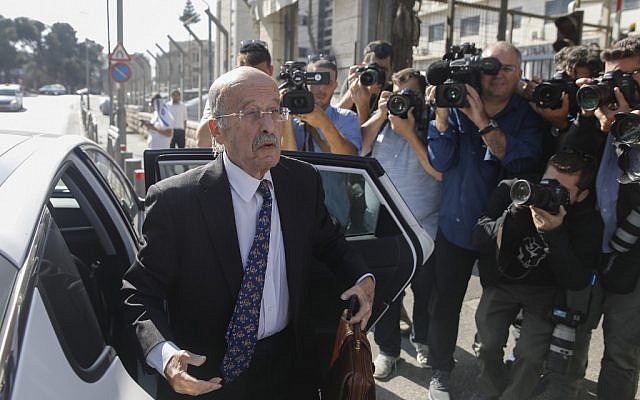
Prime Minister Benjamin Netanyahu’s pre-indictment hearing began Wednesday with his lawyers expressing confidence they could refute the corruption allegations, including bribery, leveled against him in a series of criminal cases.
Netanyahu did not accompany his lawyers as they arrived for the hearing at Justice Ministry headquarters in Jerusalem. Instead, he was scheduled to meet with his political allies as talks on forming a government following last month’s elections have been floundering.
Representing the prime minister at the hearings is a 10-strong defense team. They were squaring off with some 20 state prosecution officials, led by Attorney General Avichai Mandelblit, State Prosecutor Shai Nitzan and Liat Ben-Ari, the lead prosecutor in the three criminal cases against Netanyahu.
As Mandelblit arrived for the hearing, a handful of demonstrators gathered outside the Justice Ministry in a show of support for prosecutors. They carried signs reading, “The truth and the law will speak, we came to strengthen you in the fight against corruption.”
Speaking to reporters outside the Justice Ministry, Netanyahu lawyer Ram Caspi rejected a suggestion that Netanyahu would seek a plea deal or clemency.
“I have complete and unreserved confidence in the legal system and law enforcement. I have no doubt the attorney general will formulate his decisions in a professional and appropriate manner,” he said.
Caspi added that he believes there are “solid grounds” for reconsidering the allegations against Netanyahu, as detailed by Mandelblit in his draft charge sheet, which was published in February.
Amit Hadad, another of the premier’s attorneys, said the defense team would present new evidence at the hearings.
“We’re sure that when we finish, there will be no choice but to close the case,” the Kan public broadcaster quoted him as saying. “These cases must be closed.”
The hearings, which will see Netanyahu’s lawyers argue his conduct was entirely proper and within the boundaries of the law, will stretch over four days this week and next week, and wrap up before the start of the Yom Kippur fast next Tuesday evening.
Prosecution officials told Channel 12 news on Tuesday they hoped to reach a final decision on whether to indict the premier by the end of the year.
The hearings for Wednesday and Thursday will focus on Case 4000, considered to be the most serious of the three cases faced by Netanyahu.
In that case, Netanyahu is accused of pushing regulatory decisions as communications minister and prime minister from 2015 to 2017 that benefited Shaul Elovitch, the controlling shareholder in the Bezeq telecom giant, in exchange for positive coverage from Elovitch’s Walla news site. That case includes a proposed bribery charge for both Netanyahu and Elovitch.
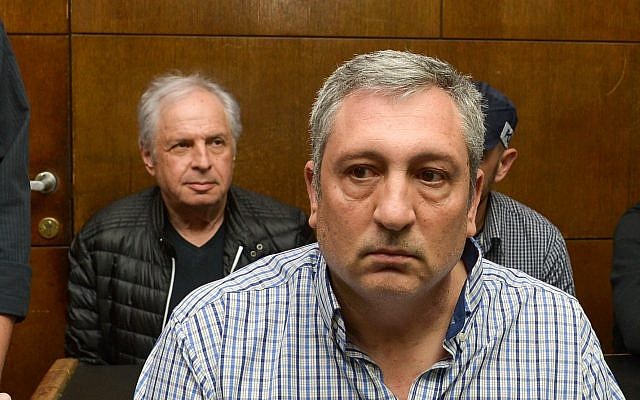
According to Hebrew media reports, the defense team will assert that Netanyahu acted entirely according to the opinions and directives of government professionals; they will deny any mutually beneficial relations with Elovitch; they will stress that all politicians have complex relations with the media; they will claim state’s witnesses Shlomo Filber and Nir Hefetz were pressured unreasonably to testify against Netanyahu.
Cases 1000 and 2000 will be discussed on Sunday and Monday.
In Case 1000, Netanyahu is alleged to have received tens of thousands of dollars’ worth of gifts from Arnon Milchan, an Israeli Hollywood producer, and James Packer, an Australian casino mogul.
Mandelblit said he intends to charge Netanyahu with fraud and breach of trust.
Netanyahu’s attorneys will insist the gifts were legitimate as it is permissible to receive gifts from friends. They will also assert the value of the gifts is much lower than the charges suggest.
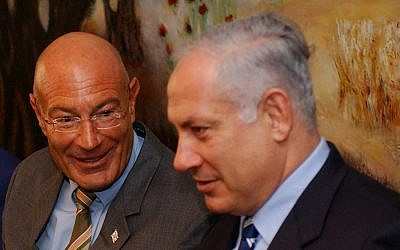
In Case 2000, Netanyahu is accused of agreeing with Yedioth Ahronoth newspaper publisher Arnon Mozes to weaken a rival daily in return for more favorable coverage from Yedioth. In that case, Mandelblit will seek to charge the premier with breach of trust, while Mozes will be charged with bribery. Mozes underwent his own pre-indictment hearing last month.
The prime minister’s team will insist the conversations between Netanyahu and Mozes — of which prosecutors possess hours’ worth of recordings — were nothing more than talk, and that Netanyahu had never intended to act on them.
The hearing was stretched this week from its original planned two days on October 2-3 to a total expected four days over the coming week.
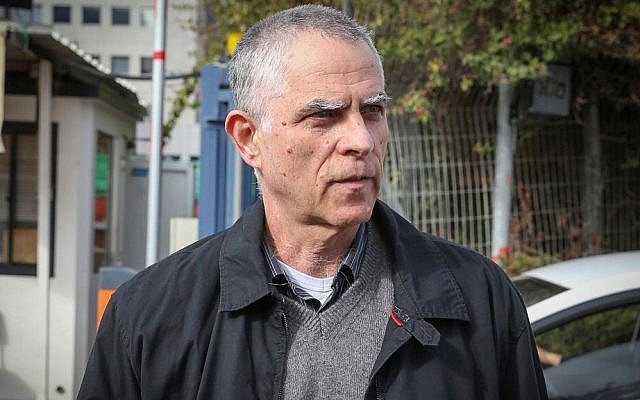
Netanyahu’s lawyers had filed the request Thursday, claiming they need more time to present all of their arguments in the prime minister’s defense. That was the same day that Netanyahu made a public appeal that the pre-indictment hearings be broadcast live, a request that Mandelblit rejected as “futile” and “without legal basis.”
Netanyahu’s lawyers have only submitted a single page to Mandelblit ahead of the hearing instead of a comprehensive file laying out the Likud party leader’s defense.
In February, Mandelblit announced his intention to indict Netanyahu pending the hearing process.
Netanyahu denies all the allegations against him and claims they constitute a witch hunt by his political opposition, media, police and state prosecutors to remove him from office, which he has held for a total of over 13 years, the longest in the state’s history.
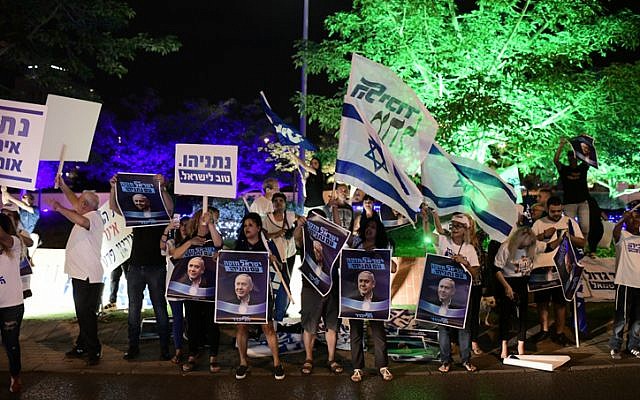
On Tuesday night around 300 Netanyahu supporters demonstrated outside Mandelblit’s home in Petah Tikva.
Activists chanted slogans in support of the prime minister and claimed the cases against him were a plot by justice officials and the media — a line that has been pushed by the prime minister himself.
As reported by The Times of Israel
